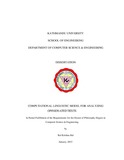Please use this identifier to cite or link to this item:
http://archive.nnl.gov.np:8080/handle/123456789/27| Title: | COMPUTATIONAL LINGUISTIC MODEL FOR ANALYZING OPINIONATED TEXTS |
| Authors: | Bal Krishna Bal |
| Keywords: | Editorials and opinion articles in general express their views or opinions about some particular event or happening. These views or opinions are meant to influence or convince the readers and hence may resort to any means of expression in the text in order to make the text sound convincing. In order to support one's thesis or statement, the author may produce facts or mere opinions in disguise of facts. It can also involve exaggerations, sarcasm and irony, biases etc. This makes analyzing the opinions and the argumentation structure in editorials quite a challenging task. Fully understanding the intended meanings conveyed by editorials is also an equally challenging task as knowledge of previous discourse and contexts is required. A synthesis of consolidated information from multiple sources could be a step towards getting a balanced account of events. This research aims to build the technology required for such a synthesis. Preliminary knowledge about the research problem is gathered via an extensive literature review from a number of interrelated disciplines and sub-disciplines of Artificial Intelligence and Computational Linguistics thus building on partial solutions available. Based on the knowledge gathered from the literature review, specifications of the linguistic features required for analyzing opinions and arguments in opinionated texts are developed. The specifications developed are then validated via a manual analysis of real opinionated texts, as a result of which a semantic tagset is developed for annotating the opinions and argumentation elements in opinionated texts. The viability and usefulness of the semantic tagset is then studied through an inter-annotator agreement study for annotating real opinionated texts. Existing research problems in Opinion Mining are still too focused in the the lower levels, viz., lexical, phrase and sentence levels. Even in these lower levels, issues regarding inadequate lexicon coverage and poor adaptability of the lexicons in cross-domain situations prevail. There are increasing trends of the use of machine learning approaches for solving one or more of these tasks but as the scope of the analysis and synthesis gets wider together with the involvement of vi multiple attributes for the task, the role of lexicon and dictionary based approaches along with the data and patterns from the corpus becomes quite prominent. The given work extends the analysis of opinions in the paragraph level by borrowing the concepts like "opening-statement-thesis" and "supports" from argumentation theory and "rhetorical relations" from rhetorical structure theory and discourse analysis. A synthesis of opinions and arguments from multiple sources is conducted based on the analyses of opinions in the lexical, phrase, sentence and paragraph levels in the form of annotations. |
| Issue Date: | 29-Mar-2019 |
| Abstract: | Editorials and opinion articles in general express their views or opinions about some particular event or happening. These views or opinions are meant to influence or convince the readers and hence may resort to any means of expression in the text in order to make the text sound convincing. In order to support one's thesis or statement, the author may produce facts or mere opinions in disguise of facts. It can also involve exaggerations, sarcasm and irony, biases etc. This makes analyzing the opinions and the argumentation structure in editorials quite a challenging task. Fully understanding the intended meanings conveyed by editorials is also an equally challenging task as knowledge of previous discourse and contexts is required. A synthesis of consolidated information from multiple sources could be a step towards getting a balanced account of events. This research aims to build the technology required for such a synthesis. Preliminary knowledge about the research problem is gathered via an extensive literature review from a number of interrelated disciplines and sub-disciplines of Artificial Intelligence and Computational Linguistics thus building on partial solutions available. Based on the knowledge gathered from the literature review, specifications of the linguistic features required for analyzing opinions and arguments in opinionated texts are developed. The specifications developed are then validated via a manual analysis of real opinionated texts, as a result of which a semantic tagset is developed for annotating the opinions and argumentation elements in opinionated texts. The viability and usefulness of the semantic tagset is then studied through an inter-annotator agreement study for annotating real opinionated texts. Existing research problems in Opinion Mining are still too focused in the the lower levels, viz., lexical, phrase and sentence levels. Even in these lower levels, issues regarding inadequate lexicon coverage and poor adaptability of the lexicons in cross-domain situations prevail. There are increasing trends of the use of machine learning approaches for solving one or more of these tasks but as the scope of the analysis and synthesis gets wider together with the involvement of vi multiple attributes for the task, the role of lexicon and dictionary based approaches along with the data and patterns from the corpus becomes quite prominent. The given work extends the analysis of opinions in the paragraph level by borrowing the concepts like "opening-statement-thesis" and "supports" from argumentation theory and "rhetorical relations" from rhetorical structure theory and discourse analysis. A synthesis of opinions and arguments from multiple sources is conducted based on the analyses of opinions in the lexical, phrase, sentence and paragraph levels in the form of annotations. |
| URI: | http://103.69.125.248:8080/xmlui/handle/123456789/27 |
| Appears in Collections: | 000 Computer science, information & general works |
Files in This Item:
| File | Description | Size | Format | |
|---|---|---|---|---|
| PhD_Thesis_Feb2_2015.pdf | 2.05 MB | Adobe PDF |  View/Open |
Items in DSpace are protected by copyright, with all rights reserved, unless otherwise indicated.